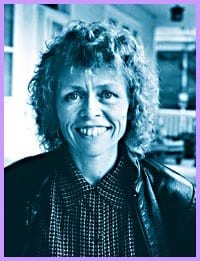It turns out that the lesbian baby boom is nothing new.
“People assumed that two women living together must just be good friends,” says professor Katherine Arnup.
“There are even stories where a woman moved her female lover into the family home with her husband and no one was suspicious…. If you add a child into the mix the assumption of heterosexuality was even stronger – because where else would it have come from?”
Arnup, of the School Of Canadian Studies at Carleton University, has spent the past few years collecting oral histories from lesbian mothers in Canada from the 1950s and ’60s.
“We don’t know much about these women because of their invisibility. In the contemporary gay and lesbian movement we fight against invisibility, but in many cases it helped protect these mothers.”
The closet was a necessary place because coming out, even to her closest friends and family, could have led to losing her child.
“Although it still happens that lesbians lose custody,” says Arnup, “in family law now the judge has to provide a reason that has something to do with the welfare of the child.”
But back then, and even into the ’70s, a proven lesbian was a “sex pervert” and necessarily an unfit mother. She would automatically lose custody and sometimes even access to her child.
Arnup became interested in researching the history of dyke parenting because it’s been largely ignored by historians.
“I’m a lesbian mother myself,” says Arnup. “I started noticing that lesbians giving oral histories on other topics might mention the fact that they were a parent in passing, but no one was really focussing on this issue. As a historian I was fascinated. The history of lesbian public life in bars has been given a lot of attention, but I think our private lives are just as important.”
Arnup says the topic is intriguing, but it’s difficult to find subjects. Her search has ranged from scouring existing lesbian oral histories for domestic references, to visiting seniors’ centres, posting notices and even reading pulp novels and sexologists’ reports from that era.
Arnup presented her work at a recent queer history conference in Chicago. “After I lecture I am always amazed by the number of lesbian mothers, as well as children of lesbians, coming up to me to say that being hidden is still their reality.
“A woman in Chicago who heard me speak came to tell me that while her mother and her mother’s lover had lived together for decades and celebrated all holidays as a family, the ‘L word’ has never been used to this day. She had never heard her experience being spoken about publicly before.”
Arnup is still looking for interview subjects; lesbian mothers in the pre-Stonewall era can contact her at karnup@ccs.carleton.ca.

 Why you can trust Xtra
Why you can trust Xtra


